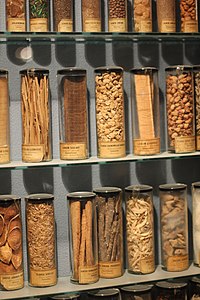
Photo from wikipedia
Background: Tertiary drug information resources are utilized frequently by health care providers. While pharmacists are uniquely trained and prepared to interpret the information available on these resources, including the results… Click to show full abstract
Background: Tertiary drug information resources are utilized frequently by health care providers. While pharmacists are uniquely trained and prepared to interpret the information available on these resources, including the results of drug-drug interaction evaluations, discrepancies between such resources pose a major concern for clinicians with regard to patient safety and medication regimen efficacy. It was postulated that drug-drug interaction evaluations between prescription medications and over-the-counter herbal supplements would be particularly problematic. Objective: The objective of this project was to distinguish the discrepancies between tertiary drug information resources in the setting of drug-drug interactions between tricyclic antidepressants (TCAs) and herbal supplements. Methods: The following medications and herbal supplements were evaluated on Lexicomp, Micromedex, and Medscape: amitriptyline, nortriptyline, doxepin, imipramine, desipramine, amoxapine, St. John’s Wort, valerian root, ginkgo biloba, and ginseng. Results: While all of the tertiary drug information resources identified a significant reaction between each TCA and St. John’s Wort due to the risk of serotonin syndrome, several other discrepancies were noted, with regard to both the severity of the interaction indicated and whether or not an interaction was identified. Conclusion: It is imperative that clinicians be aware of potential discrepancies between tertiary drug information resources, including the potential for variation in both the clinical interpretation of its severity and the recognition of an interaction.
Journal Title: Journal of Pharmacy Technology
Year Published: 2023
Link to full text (if available)
Share on Social Media: Sign Up to like & get
recommendations!